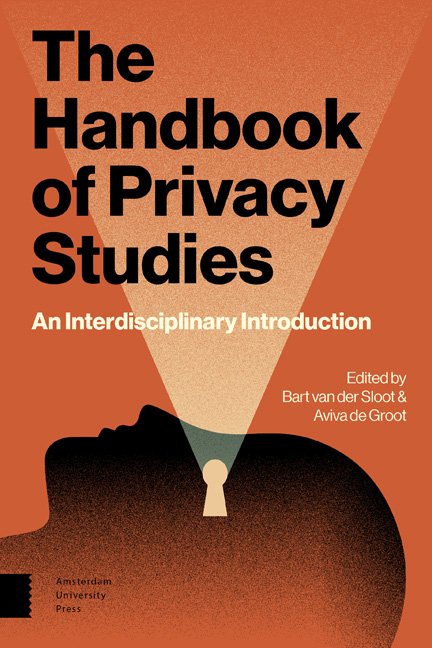Book contents
- Frontmatter
- Contents
- Introduction
- 1 Privacy from a Historical Perspective
- Legislating Privacy: Technology, Social Values, and Public Policy
- 2 Privacy from a Legal Perspective
- Three Dimensions of Privacy
- 3 Privacy from an Ethical Perspective
- Nudging: A Very Short Guide
- 4 Privacy from an Economic Perspective
- Security, Privacy, and the Internet of Things (IoT)
- 5 Privacy from an Informatics Perspective
- Political Science and Privacy
- 6 Privacy from an Intelligence Perspective
- A Privacy Doctrine for the Cyber Age
- 7 Privacy from an Archival Perspective
- Medical Privacy: Where Deontology and Consequentialism Meet
- 8 Privacy from a Medical Perspective
- Privacy Law – on the Books and on the Ground
- 9 Privacy from a Media Studies Perspective
- Diversity and Accountability in Data-Rich Markets
- 10 Privacy from a Communication Science Perspective
- Still Uneasy: a Life with Privacy
- 11 Privacy from an Anthropological Perspective
- About the Authors
3 - Privacy from an Ethical Perspective
- Frontmatter
- Contents
- Introduction
- 1 Privacy from a Historical Perspective
- Legislating Privacy: Technology, Social Values, and Public Policy
- 2 Privacy from a Legal Perspective
- Three Dimensions of Privacy
- 3 Privacy from an Ethical Perspective
- Nudging: A Very Short Guide
- 4 Privacy from an Economic Perspective
- Security, Privacy, and the Internet of Things (IoT)
- 5 Privacy from an Informatics Perspective
- Political Science and Privacy
- 6 Privacy from an Intelligence Perspective
- A Privacy Doctrine for the Cyber Age
- 7 Privacy from an Archival Perspective
- Medical Privacy: Where Deontology and Consequentialism Meet
- 8 Privacy from a Medical Perspective
- Privacy Law – on the Books and on the Ground
- 9 Privacy from a Media Studies Perspective
- Diversity and Accountability in Data-Rich Markets
- 10 Privacy from a Communication Science Perspective
- Still Uneasy: a Life with Privacy
- 11 Privacy from an Anthropological Perspective
- About the Authors
Summary
Introduction
Philosophy is a rich discipline consisting of many branches that focus on a wide range of questions. Epistemology, for instance, is the study of knowledge and focuses on questions like ‘What conditions need to be fulfilled for something to count as knowledge?’ Aesthetics is another example, which is the study of (the nature of) art and beauty. Ethics is the branch of philosophy that, in its most general sense, is concerned with the question of what we ought to do. More specifically, ethicists often focus on normative questions concerning (1) the value of certain goods, practices, or norms, and (2) how – given those values – we should act and relate to each other. The ethics of privacy, then, focuses on questions such as ‘What is the value of privacy?’ and ‘What privacy norms should be respected by individuals (including ourselves), society, and the state?’
The formulation ‘the ethics of privacy’ might suggest that there is one ethics of privacy. Nothing could be further from the truth. Precisely because ethics is concerned with normative questions, there are no fixed answers to any of these questions. The answer to a normative question admits to different degrees or plausibility, relative to the arguments provided. As a result, different ethicists develop and argue for different theories of the value of privacy, which, in turn, often implies that they also identify different norms that should regulate privacy-related behaviours and policies.
This chapter will focus on the most important and influential ethical theories of privacy. First, some of the important conceptual distinctions that figure prominently in the ethical literature on privacy will be discussed. Here, the definition and function of privacy are discussed. Second, the classical text that laid the foundation for all contemporary analyses of both the legal and moral right to privacy is discussed. Third, the most important and influential perspectives on privacy's value, and what that implies for the norms that should regulate our behaviour and policies, are discussed. In this section, perspectives that are critical of (particular aspects of) privacy are discussed as well.
- Type
- Chapter
- Information
- The Handbook of Privacy StudiesAn Interdisciplinary Introduction, pp. 143 - 172Publisher: Amsterdam University PressPrint publication year: 2018
- 1
- Cited by



